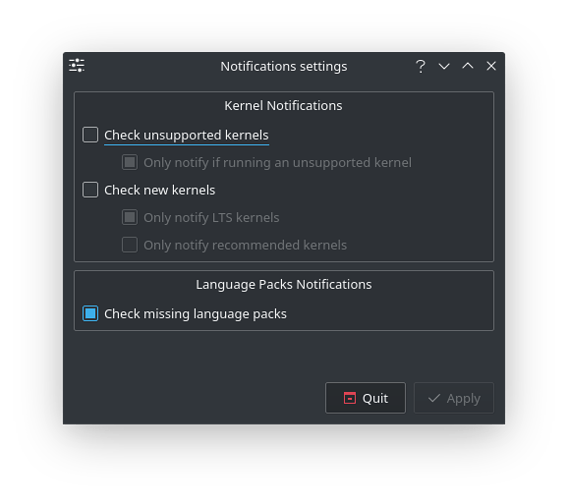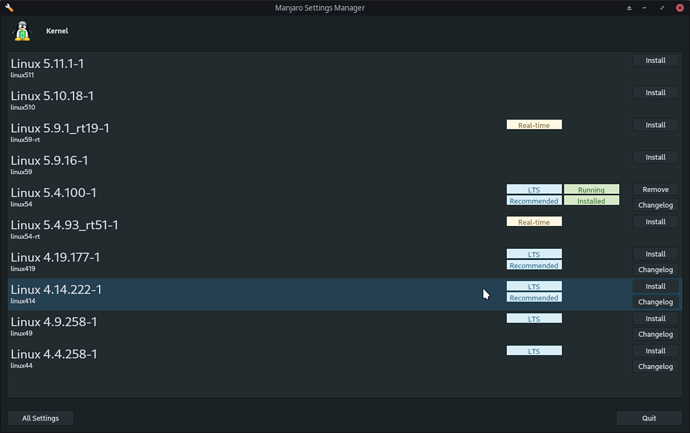Two times the last days I have got a prompt saying:
“Newer kernel availeble, please update.”
If I open it I can see a list of Kernel versions, and I can click select and install. But is this something I should do?
Inix output:
System:
Kernel: 5.9.16-1-MANJARO x86_64 bits: 64 compiler: gcc v: 10.2.1
parameters: BOOT_IMAGE=/boot/vmlinuz-5.9-x86_64
root=UUID=dc9d5ed1-acd3-4c02-a140-0b1e68d3271d rw quiet apparmor=1
security=apparmor udev.log_priority=3
Desktop: Xfce 4.16.0 tk: Gtk 3.24.24 info: xfce4-panel wm: xfwm4
dm: LightDM 1.30.0 Distro: Manjaro Linux
Machine:
Type: Desktop Mobo: ASRock model: Z370 Pro4 serial: <filter>
UEFI [Legacy]: American Megatrends v: P4.30 date: 10/31/2019
Battery:
Device-1: hidpp_battery_0 model: Logitech Wireless Keyboard serial: <filter>
charge: 55% (should be ignored) rechargeable: yes status: Discharging
Device-2: hidpp_battery_1 model: Logitech M705 serial: <filter> charge: 100%
rechargeable: yes status: Discharging
Memory:
RAM: total: 15.57 GiB used: 2.92 GiB (18.7%)
RAM Report: permissions: Unable to run dmidecode. Root privileges required.
CPU:
Info: 6-Core model: Intel Core i5-8400 bits: 64 type: MCP arch: Kaby Lake
note: check family: 6 model-id: 9E (158) stepping: A (10) microcode: DE
L2 cache: 9 MiB bogomips: 33613
Speed: 800 MHz min/max: 800/4000 MHz Core speeds (MHz): 1: 800 2: 800 3: 800
4: 800 5: 800 6: 800
Flags: 3dnowprefetch abm acpi adx aes aperfmperf apic arat arch_perfmon art
avx avx2 bmi1 bmi2 bts clflush clflushopt cmov constant_tsc cpuid
cpuid_fault cx16 cx8 de ds_cpl dtes64 dtherm dts epb ept ept_ad erms est
f16c flexpriority flush_l1d fma fpu fsgsbase fxsr ht hwp hwp_act_window
hwp_epp hwp_notify ibpb ibrs ida intel_pt invpcid invpcid_single lahf_lm lm
mca mce md_clear mmx monitor movbe mpx msr mtrr nonstop_tsc nopl nx pae pat
pbe pcid pclmulqdq pdcm pdpe1gb pebs pge pln pni popcnt pse pse36 pti pts
rdrand rdseed rdtscp rep_good sdbg sep smap smep ss ssbd sse sse2 sse4_1
sse4_2 ssse3 stibp syscall tm tm2 tpr_shadow tsc tsc_adjust
tsc_deadline_timer vme vmx vnmi vpid x2apic xgetbv1 xsave xsavec xsaveopt
xsaves xtopology xtpr
Vulnerabilities: Type: itlb_multihit status: KVM: VMX disabled
Type: l1tf
mitigation: PTE Inversion; VMX: conditional cache flushes, SMT disabled
Type: mds mitigation: Clear CPU buffers; SMT disabled
Type: meltdown mitigation: PTI
Type: spec_store_bypass
mitigation: Speculative Store Bypass disabled via prctl and seccomp
Type: spectre_v1
mitigation: usercopy/swapgs barriers and __user pointer sanitization
Type: spectre_v2 mitigation: Full generic retpoline, IBPB: conditional,
IBRS_FW, STIBP: disabled, RSB filling
Type: srbds mitigation: Microcode
Type: tsx_async_abort status: Not affected
Graphics:
Device-1: AMD Lexa PRO [Radeon 540/540X/550/550X / RX 540X/550/550X]
vendor: XFX Pine driver: amdgpu v: kernel bus ID: 03:00.0 chip ID: 1002:699f
class ID: 0300
Display: x11 server: X.Org 1.20.10 driver: loaded: amdgpu,ati
unloaded: modesetting alternate: fbdev,vesa display ID: :0.0 screens: 1
Screen-1: 0 s-res: 3840x1080 s-dpi: 96 s-size: 1016x285mm (40.0x11.2")
s-diag: 1055mm (41.5")
Monitor-1: DisplayPort-0 res: 1920x1080 hz: 60 dpi: 96
size: 509x286mm (20.0x11.3") diag: 584mm (23")
Monitor-2: HDMI-A-0 res: 1920x1080 hz: 60 dpi: 96
size: 509x286mm (20.0x11.3") diag: 584mm (23")
OpenGL: renderer: Radeon RX550/550 Series (POLARIS12 DRM 3.39.0
5.9.16-1-MANJARO LLVM 11.1.0)
v: 4.6 Mesa 20.3.4 direct render: Yes
Audio:
Device-1: Intel 200 Series PCH HD Audio vendor: ASRock driver: snd_hda_intel
v: kernel bus ID: 00:1f.3 chip ID: 8086:a2f0 class ID: 0403
Device-2: AMD Baffin HDMI/DP Audio [Radeon RX 550 640SP / RX 560/560X]
vendor: XFX Pine driver: snd_hda_intel v: kernel bus ID: 03:00.1
chip ID: 1002:aae0 class ID: 0403
Device-3: Logitech Headset H390 type: USB
driver: hid-generic,snd-usb-audio,usbhid bus ID: 1-13:4 chip ID: 046d:0a44
class ID: 0300
Sound Server: ALSA v: k5.9.16-1-MANJARO
Network:
Device-1: Intel Ethernet I219-V vendor: ASRock driver: e1000e v: kernel
port: f000 bus ID: 00:1f.6 chip ID: 8086:15b8 class ID: 0200
IF: eno1 state: up speed: 1000 Mbps duplex: full mac: <filter>
IP v4: <filter> type: dynamic noprefixroute scope: global
broadcast: <filter>
IP v6: <filter> type: noprefixroute scope: link
WAN IP: <filter>
Bluetooth:
Message: No Bluetooth data was found.
RAID:
Message: No RAID data was found.
Drives:
Local Storage: total: 2.05 TiB used: 472.35 GiB (22.5%)
SMART Message: Required tool smartctl not installed. Check --recommends
ID-1: /dev/sda maj-min: 8:0 vendor: Western Digital model: WD10EZEX-00ZF5A0
size: 931.51 GiB block size: physical: 4096 B logical: 512 B speed: 6.0 Gb/s
serial: <filter> rev: 0A80 scheme: MBR
ID-2: /dev/sdb maj-min: 8:16 vendor: Samsung model: SSD 860 EVO 250GB
size: 232.89 GiB block size: physical: 512 B logical: 512 B speed: 6.0 Gb/s
rotation: SSD serial: <filter> rev: 1B6Q scheme: MBR
ID-3: /dev/sdc maj-min: 8:32 type: USB vendor: Toshiba model: MQ01ABD100
size: 931.51 GiB block size: physical: 512 B logical: 512 B
rotation: 5400 rpm serial: <filter> scheme: MBR
Message: No Optical or Floppy data was found.
Partition:
ID-1: / raw size: 232.88 GiB size: 228.23 GiB (98.00%)
used: 46.31 GiB (20.3%) fs: ext4 dev: /dev/sdb1 maj-min: 8:17 label: N/A
uuid: dc9d5ed1-acd3-4c02-a140-0b1e68d3271d
ID-2: /mnt/Marvels_daddy raw size: 893.17 GiB size: 878.15 GiB (98.32%)
used: 426.04 GiB (48.5%) fs: ext4 dev: /dev/sda1 maj-min: 8:1
label: Marvels_daddy uuid: 59b08e4b-1a8f-45f2-a410-5629bc1b1b7b
Swap:
Alert: No Swap data was found.
Unmounted:
ID-1: /dev/sda2 maj-min: 8:2 size: 38.34 GiB fs: ext4 label: Timeshift
uuid: 404732aa-045c-4759-b8b0-0366e051437d
ID-2: /dev/sdc1 maj-min: 8:33 size: 931.51 GiB fs: ntfs label: TOSHIBA EXT
uuid: F086EAE086EAA676
USB:
Hub-1: 1-0:1 info: Full speed (or root) Hub ports: 16 rev: 2.0
speed: 480 Mb/s chip ID: 1d6b:0002 class ID: 0900
Device-1: 1-1:2 info: Logitech Unifying Receiver type: Keyboard,Mouse
driver: logitech-djreceiver,usbhid interfaces: 2 rev: 2.0 speed: 12 Mb/s
chip ID: 046d:c534 class ID: 0301
Hub-2: 1-10:3 info: Terminus Hub ports: 4 rev: 2.0 speed: 480 Mb/s
chip ID: 1a40:0101 class ID: 0900
Device-1: 1-10.2:5 info: Logitech Unifying Receiver type: Keyboard,Mouse,HID
driver: logitech-djreceiver,usbhid interfaces: 3 rev: 2.0 speed: 12 Mb/s
chip ID: 046d:c52b class ID: 0300
Device-2: 1-13:4 info: Logitech Headset H390 type: Audio,HID
driver: hid-generic,snd-usb-audio,usbhid interfaces: 4 rev: 1.1
speed: 12 Mb/s chip ID: 046d:0a44 class ID: 0300
Hub-3: 2-0:1 info: Full speed (or root) Hub ports: 10 rev: 3.0 speed: 5 Gb/s
chip ID: 1d6b:0003 class ID: 0900
Device-1: 2-3:2 info: Toshiba America External USB 3.0 type: Mass Storage
driver: usb-storage interfaces: 1 rev: 3.0 speed: 5 Gb/s chip ID: 0480:a00a
class ID: 0806 serial: <filter>
Sensors:
System Temperatures: cpu: 29.0 C mobo: N/A gpu: amdgpu temp: 29.0 C
Fan Speeds (RPM): N/A gpu: amdgpu fan: 1554
Info:
Processes: 270 Uptime: 45m wakeups: 10 Init: systemd v: 247 Compilers:
gcc: 10.2.0 Packages: 1328 pacman: 1310 lib: 407 flatpak: 10 snap: 8
Shell: Bash v: 5.1.0 running in: xfce4-terminal inxi: 3.3.01
Thank you
 . I’ll go with the safest bet I guess.
. I’ll go with the safest bet I guess. ) Which it seems you don’t, or it would’ve updated to the latest kernel.
) Which it seems you don’t, or it would’ve updated to the latest kernel.
